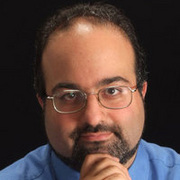The Carleton College Humanities Center invites the public to a provocative new series entitled “Censorship, Blasphemy and Free Speech.” The series kicks off with a special appearance by renowned professor of Islamic studies, Omid Safi. Safi will present the 2013 Ira Wender Lecture, “Middle East, Islam & American Empire,” on Wednesday, Sept. 25 at 7 p.m. in the Weitz Center for Creativity, Room 236. This event, which will be followed by a reception with light refreshments, is free and open to the public.
This special series continues on Thursday, September 26 at 12 p.m. in the Gould Library Athenaeum, when Safi will present a lecture entitled “Whose Freedom of Speech Counts?”
The years since 9/11 have continued to see an escalation of America's involvement with various Middle Eastern countries, including the wars in Afghanistan and Iraq, the tensions with Iran, as well as fraught relationships with Turkey, Saudi Arabia, Israel and Egypt. Connected to these tensions is the rise of Islamophobia both towards Middle East as well as America's Muslim population. Professor Safi will examine how America's increased entanglement in the Middle East is also shaping (and betraying) America's own democratic experiment.
An Iranian-American, Safi is a professor of Islamic studies at the University of North Carolina, Chapel Hill, where he specializes in Islamic mysticism (Sufism), contemporary Islamic thought and medieval Islamic history. He has served on the board of the Pluralism project at Harvard University and is the co-chair of the steering committee for the Study of Islam at the American Academy of Religion.
“The series is designed to coincide with the 25th anniversary of the publication of Salman Rushdie’s The Satanic Verses and the reaction to the publication, known as ‘the Rushie Affair’,” explains Susannah Ottaway, Carleton professor of history and the David and Marian Adams Bryn-Jones Distinguished Teaching Professor of the Humanities. First published in the United Kingdom in 1988, many Muslims around the world had a very heated and violent reaction to Rushdie’s The Satanic Verses, accusing Rushie of blasphemy and in 1989 the Ayatollah Ruhollah Khomeini issued a fatwa ordering Muslims to kill Rushdie.
English writer Hanif Kureishi called the fatwa “one of the most significant events in postwar literary history.” The primary debate was the Western value of freedom of expression—that no one “should be killed, or face a serious threat of being killed, for what they say or write”—against the view of many Muslims—that no one should be free to “insult and malign Muslims” by disparaging the “honor of the Prophet” Muhammad. The Iranina government backed the fatwa against Rushdie until 1998, when the Ayatollah Khomeini was succeeded by Iranian President Mohammad Khatami, who said the government no longer supported the killing of Rushdie.
This event is sponsored by the Carleton College Humanities Center. For information, including disability accommodations, call (507) 222-4217. The Weitz Center for Creativity is located at Third and College Streets in Northfield.



